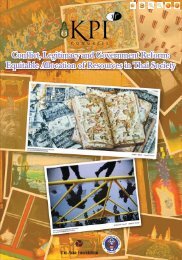SUFFiciENcy EcONOMy ANd GRASSROOtS DEvElOPMENt
SUFFiciENcy EcONOMy ANd GRASSROOtS DEvElOPMENt
SUFFiciENcy EcONOMy ANd GRASSROOtS DEvElOPMENt
You also want an ePaper? Increase the reach of your titles
YUMPU automatically turns print PDFs into web optimized ePapers that Google loves.
236<br />
The Meaning of Sufficiency Economy <br />
International Conference<br />
waiting to blossom in Trang, Chaiyaphum, Nakhon Phanom, Udon Thani, Roi Et<br />
and Loei. 8 <br />
The economy of Asoke centres is based on organic agriculture. They have<br />
bought or rented fields for rice cultivation and gardens for vegetables. Each centre<br />
usually also produces its own tofu, mushrooms and drinking water. Additionally the<br />
centres produce and sell herbal shampoos, detergents, mosquito repellants, herbal<br />
medicine and herbal teas. These products are sold to the public in cooperative shops<br />
on a very small profit. Yet this income enables the centres to invest in computers,<br />
vehicles, dental clinics, and leaves them enough with resources to run primary,<br />
secondary and vocational schools free of charge. In case of emergency, Asoke group<br />
can send a sick community member to a well-equipped modern hospital. <br />
Asoke group publishes several weekly and monthly magazines, which discuss<br />
both Buddhist and general topics from politics to traveling. The group publishes<br />
books, tapes and DVDs with the teaching and preaching of various Asoke monks. 9<br />
After the liberalisation of the private TV satellite channels, the Asoke has their own<br />
TV channel called For Mankind TV (FMTV). <br />
Buddhism as interpreted by the leader of the group, Bodhiraksa, is the greatest<br />
source of spiritual inspiration for the Asoke people. On the intellectual level, the<br />
influence of E. F. Schumacher’s chapter on “Buddhist Economics” of his book<br />
“Small Is Beautiful” is obvious.<br />
<br />
‘RIGHT LIVELIHOOD’ – SAMMA AJIVA<br />
The Noble Eightfold Path mentions as the fifth ‘step’ that a practising Buddhist<br />
should carefully choose his or her profession. There are certain professions and<br />
occupations, which are totally banned for a Buddhist, according to the teachings. <br />
A Buddhist should not trade in arms, drugs and other intoxicants. Neither should <br />
a Buddhist be involved in trafficking in human beings. Selling animals as well as<br />
selling meat is banned, as refraining from destroying any life is the first precept for a<br />
Buddhist to follow. The five improper occupations (Miccha Ajiva) include stealing,<br />
cheating, deceiving, working for a bad person and working only for a money.<br />
There are no recommendations which professions are advisable, but usually<br />
Buddhism emphasises the opposite virtues of killing and hating i.e. compassion,<br />
mercy and nurturing life. <br />
“To refrain from destroying life” is the first precept. The precepts have an<br />
opposite set of recommendations, where the first recommendation consequently<br />
8<br />
There were 25 registered Asoke villages in Thailand in July 2011.<br />
9<br />
A very popular Asoke monk is Than Chan, who has had his own TV and radio programmes.<br />
Many of his followers were not initially aware of the fact that he is from the controversial Santi<br />
Asoke group.














